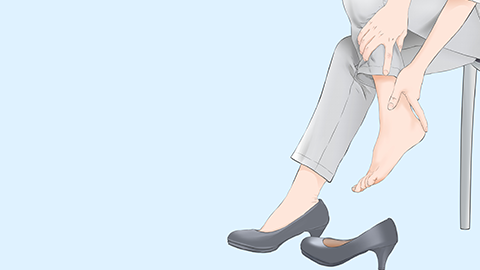What causes pain in the back of the heel?
Generally, the main causes of heel pain include prolonged standing or walking, wearing improper footwear, plantar fasciitis, Achilles tendinitis, and heel spurs. If discomfort occurs, it is recommended to seek timely diagnosis and treatment at a regular hospital. Detailed analysis is as follows:
1. Prolonged Standing or Walking
Long-term standing or frequent walking continuously pressures the heel, causing repeated friction and tension on the soft tissues of the sole, leading to local congestion, swelling, and pain. Daily routines should include reducing standing and walking durations, avoiding excessive fatigue, elevating the lower limbs during rest to promote blood circulation, and soaking feet in warm water to relieve muscle tension and reduce pain.

2. Improper Footwear
Wearing shoes that are too tight, too soft, or with overly hard soles results in uneven pressure on the heel, providing inadequate support. Long-term wearing of such shoes can easily cause injury to the soft tissues of the sole, resulting in pain. It is advisable to switch to loose, comfortable shoes with sufficient support, and to use insoles with arch support to disperse pressure on the heel, reduce soft tissue damage, and alleviate pain.
3. Plantar Fasciitis
Repeated stretching of the plantar fascia causes micro-tears, leading to aseptic inflammation. This inflammation irritates surrounding nerves, causing heel pain, especially noticeable when taking the first steps upon waking. Under a doctor's guidance, medications such as celecoxib capsules, diclofenac sodium sustained-release tablets, and ibuprofen sustained-release capsules can be taken to relieve inflammation and pain.
4. Achilles Tendinitis
Excessive repeated stretching of the Achilles tendon causes fiber tears and inflammatory reactions, manifesting as pain above the heel that worsens with activity. Under a doctor's guidance, medications such as etoricoxib tablets, naproxen sodium tablets, and flurbiprofen gel patches can be used to reduce inflammation.
5. Heel Spurs
Long-term pressure and pulling on the heel lead to bone spur formation due to subperiosteal bone proliferation. These bone spurs irritate surrounding soft tissues, causing pain that intensifies during walking. For mild symptoms, under a doctor's guidance, medications such as loxoprofen sodium tablets, meloxicam tablets, and compound chlorzoxazone tablets can be taken to alleviate pain.
In daily life, it is important to avoid excessive fatigue and choose appropriate footwear. Perform proper stretching exercises for the plantar fascia and Achilles tendon to enhance local tissue resilience. If pain persists and does not improve, timely medical consultation is necessary to identify the cause and undergo standardized treatment to prevent worsening of the condition.









